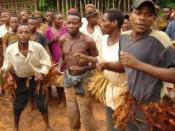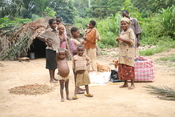Baka Family Life There has never been just one type of family. Indian, African, and European peoples have each had their own traditional ceremonies, family structures, and rites of passage. The Baka people have similar family life characteristics as that of the ideal family. There were many aspects of the Baka family life that I observed.
The Baka live deep in the rainforest in Africa, relying on the forest for survival. Theirs is an original and unspoiled culture where co-operation and sharing is vital and music is central to their lives. Music has a central role in the life of the Baka. From an early age they have a keen sense of rhythm, as soon as a baby is able to clap it is encouraged to participate in all the communal music making. There is music for ritualistic purposes, music for passing on knowledge, stories and the history of the Baka people, and music for pure enjoyment.
With the Baka there is no distinction between musician and audience, everyone is able to listen and participate with confidence. For example when the storyteller told the story of the chimp that stole the mother's baby all joined in with the choruses or with harmonies and with percussion accompaniment. This communal music making constantly helps to strengthen the bonds between the individuals in the groups.
Communication is another important element of the Baka people. Everyone in the tribe communicates with one another so all members feel a freedom within the group to express themselves freely. Even jokingly, the mother and father talk to one another about their son saying that he "eats like a greedy bird", a sure sign of communication.
The parents in the family set the tone. They are good role models that lead by example. The parents are the providers, teachers, and caretakers of the family and are so not by choice, but by love, affection, and respect. The mother (women) gets the fruit, prepares food, and provides shelter for the family. The father (men) hunts for the meat. The boys stay with their fathers to see how they do work so that they will know what their role is when they get of age. The father and mother hunt for fish in the river showing that they share the duties of the household. There is also conflict or decision making between the husband and wife shown when the tent that the wife made leaked. The husband said to "fix it" but the wife responded back with authority, "You fix it" and indeed the husband accepted the responsibility. The problem was solved without any arguments, only action, a trait that should be expressed in every family. There were also some strong children/parent relations shown when the father was teaching his son how to pick up termites with a stem and to know the proper names. Also he taught his son which termites are good to eat, and which are not.
The establishment of a stable, emotional, and spiritual environment that nurtures the Baka family is a story of unremitting struggle against great odds. There is a rich wealth of traditional knowledge that links Baka culture and other African cultures to their nature, which, if properly understood and used by outsiders as the insiders have done, could provide a solid basis for the challenges of the future.





